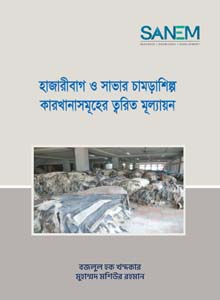Rapid Assessment of Hazaribagh and Savar Tanneries, Dhaka
 An overarching goal of Bangladesh is to attain high income country status by 2041. This will require achieving sustained economic growth of 8% to 10% over the next two decades. Expanding manufacturing export will be a key driver in this pursuit. In this context, along with Ready Made Garments, leather has also been picked as a potential sector. It has been argued that leather has the potential to attain $ 5 billion export within the medium term, if certain conditions are met. These include adoption of clean production method and improved workers’ rights and working conditions. Accordingly, government has decided to relocate the tanneries from their current location in Hazaribagh to Savar to ensure an environmentally sustainable modern tannery industry. However, the process of relocation has been slow invoking court orders for complete shut-down of all ternaries in Hazaribagh involved in wet processing operations in April 2017. Among others, the direct fall out of this development is the displacement of tannery workers numbering more than 30,000. A rapid assessment in Hazaribagh has been conducted on 455 workers in May 2017 – representing a statistically acceptable sample at 95% confidence level to find out worker’s condition during the laid off period and relocation related challenges. In order to validate some of the striking yet counter-factual outcomes, a validation assessment has been carried out in June 2017. Furthermore a significant proportion of factories have already been relocated in Savar under the condition of a not-fully functional infrastructure including central effluent treatment plant (CETP). The problems faced by workers in Savar, appear quite different than that in Hazaribagh. In particular, a key difference is that unlike Hazaribagh, there is a CETP in Savar, although not fully functional. Thus, another rapid assessment has been conducted to gather information in Savar. The findings of all three rapid assessments have been discussed in this report. The report has been supported C&A Foundation.
An overarching goal of Bangladesh is to attain high income country status by 2041. This will require achieving sustained economic growth of 8% to 10% over the next two decades. Expanding manufacturing export will be a key driver in this pursuit. In this context, along with Ready Made Garments, leather has also been picked as a potential sector. It has been argued that leather has the potential to attain $ 5 billion export within the medium term, if certain conditions are met. These include adoption of clean production method and improved workers’ rights and working conditions. Accordingly, government has decided to relocate the tanneries from their current location in Hazaribagh to Savar to ensure an environmentally sustainable modern tannery industry. However, the process of relocation has been slow invoking court orders for complete shut-down of all ternaries in Hazaribagh involved in wet processing operations in April 2017. Among others, the direct fall out of this development is the displacement of tannery workers numbering more than 30,000. A rapid assessment in Hazaribagh has been conducted on 455 workers in May 2017 – representing a statistically acceptable sample at 95% confidence level to find out worker’s condition during the laid off period and relocation related challenges. In order to validate some of the striking yet counter-factual outcomes, a validation assessment has been carried out in June 2017. Furthermore a significant proportion of factories have already been relocated in Savar under the condition of a not-fully functional infrastructure including central effluent treatment plant (CETP). The problems faced by workers in Savar, appear quite different than that in Hazaribagh. In particular, a key difference is that unlike Hazaribagh, there is a CETP in Savar, although not fully functional. Thus, another rapid assessment has been conducted to gather information in Savar. The findings of all three rapid assessments have been discussed in this report. The report has been supported C&A Foundation.
